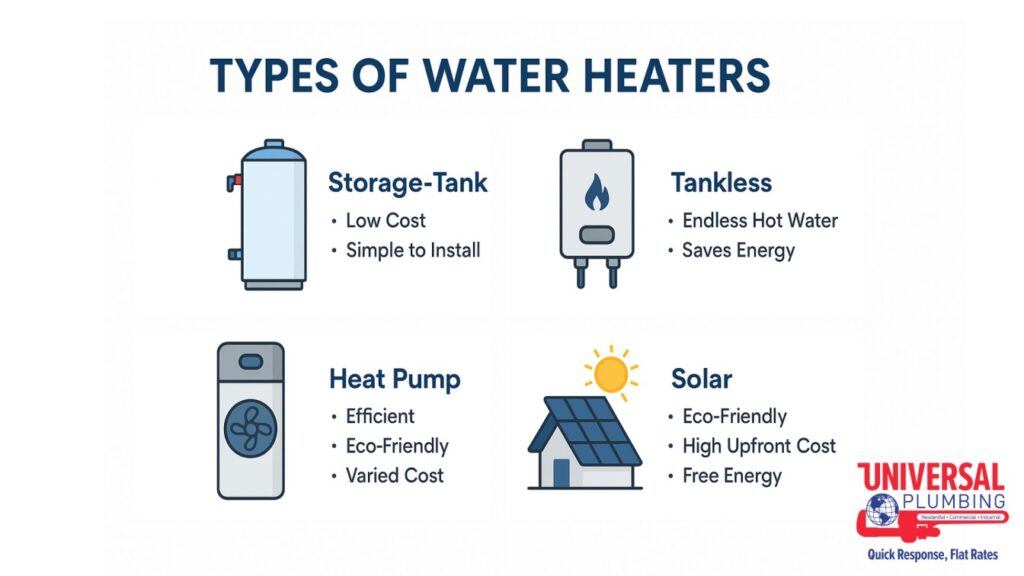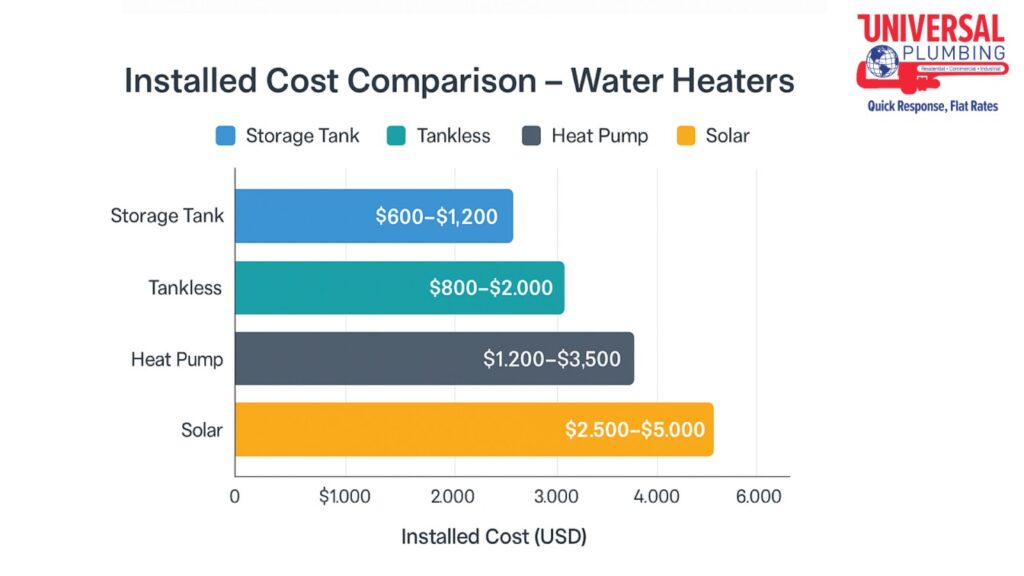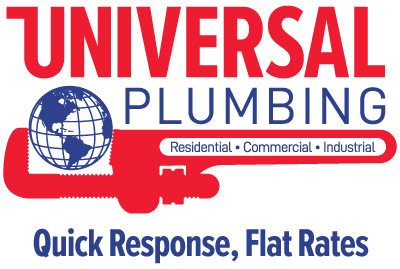Hot water is one of those home comforts you don’t think about—until it’s gone. In Atlanta’s humid summers and chilly winters, an efficient, properly sized water heater keeps your showers steamy, your dishes sparkling, and your energy bills in check. Pick the wrong system, and you could face skyrocketing operating costs, cramped utility closets, or inconvenient “run-outs” of hot water right when you need it most.
This guide covers the pros, cons, costs, efficiency, and installation considerations for every major type of residential water heater. We’ll walk you through storage-tank, tankless, heat pump, and solar models helping you choose with clear, fact-based insights so you can choose the best option for your Atlanta home.
What Are the Main Types of Residential Water Heaters?

There are four main types of residential water heaters: storage-tank (conventional), tankless (on-demand), heat pump (hybrid), and solar thermal systems. Each option offers distinct trade-offs in upfront cost, efficiency, and installation requirements. Your ideal choice will depend on your budget, available space, household hot-water demand, and long-term energy savings goals.
Storage-Tank Water Heaters
What is a storage-tank water heater?
A storage-tank water heater keeps a reservoir of hot water on standby, ready to deliver at the turn of a faucet. Storage-tank units heat incoming cold water in an insulated steel tank—typically 30–80 gallons—using a gas burner or electric elements, then maintains that temperature with periodic reheating cycles. In Atlanta homes, common models include the Rheem Performance Platinum® series (40–50 gal) and the A.O. Smith GPVX-75 (standard 50 gal), prized for their balance of reliability and serviceability.
What are the key attributes and values of storage-tank heaters?
- Capacity: 30–80 gal (40 gal is most common for 2–3 person households)
- Fuel Types: Natural gas, electric resistance, propane
- Average Installed Cost: $600–$1,200 (including labor)
- Energy Factor (EF): 0.60–0.75 (EF measures thermal efficiency; higher is better)
- Expected Lifespan: 8–12 years
What are the pros and cons of storage-tank water heaters?
Pros:
- Lower upfront equipment and installation cost ($600–$1,200 vs. $800–$2,000 for tankless)
- Simple retrofit into existing plumbing and venting
- Familiar technology with widespread serviceability
Cons:
- Standby heat loss (maintaining temperature 24/7 adds ~10–20% to energy use)
- Larger footprint (requires a closet or utility area of at least 3 × 3 ft)
How much space and installation requirements does a storage-tank heater need?
Most storage-tank units demand a flat, level floor space of at least 36 × 36 inches, with 12 inches of clearance on all sides for service access. Gas models also require a vent pipe to the exterior and a ¾-inch gas supply line capable of 40–50 MBH input. Electric versions need a dedicated 240 V circuit—typically two 30 A breakers—and a water‐seal pan underneath if installed in an attic or above finished space. Integrated drain lines and pressure‐relief piping must discharge within 6 inches of the floor.
Tankless (On-Demand) Water Heaters
What is a tankless water heater?
A tankless water heater heats water on demand as it flows through a compact heat exchanger. When you open a hot-water tap, cold water enters the unit and is rapidly warmed by either a gas burner or electric heating element—eliminating the need for a standby tank.
In Atlanta, tankless systems have grown in popularity by 15–20% year-over-year as homeowners trade bulky closets for wall-mounted units and seek energy savings amid rising utility rates. Compact footprints and on-demand performance make them especially attractive for infill homes and kitchen remodels.
What are the key attributes and values of tankless heaters?
- Flow Rate: 2–11 gallons per minute (GPM), with 6–8 GPM models ideal for two simultaneous showers
- Fuel Types: Natural gas, propane, or electric
- Average Installed Cost: $800–$2,000 (unit + labor; gas tends higher due to venting)
- Energy Factor (EF): 0.82–0.99 (EF measures delivered hot water per unit energy input)
- Expected Lifespan: 15–20 years (longer than storage tanks due to no corrosion from a tank)
What are the pros and cons of tankless water heaters?
Pros:
- Endless hot water: No tank means you won’t run out during peak use.
- Energy savings: Eliminates standby losses; can save 10–30% on water-heating bills.
Cons:
- Higher upfront cost: $800–$2,000 vs. $600–$1,200 for a comparable tank model.
- Electrical upgrades: Electric units may require a 200 A service or upgraded panel; gas units need proper venting.
How do I size a tankless water heater?
Measured in GPM, sizing a tankless water heater hinges on your peak hot-water demand. A typical two-bathroom Atlanta home needs 6–8 GPM capacity to run a shower and kitchen faucet simultaneously. Use our GPM sizing calculator to estimate your flow requirements—then choose a model rated at or above that value to ensure consistent performance.
Heat Pump Water Heaters
What is a heat pump water heater?
A heat pump water heater uses an air-source refrigeration cycle to extract ambient heat and transfer it into your water storage tank. Unlike conventional electric-resistance heaters, it moves heat rather than generating it, pulling warmth from the surrounding air—even in Atlanta’s mild winters—to achieve high efficiency.
In Atlanta’s year-round moderate climate (average winter lows around 35°F), heat pump units operate near their optimal Coefficient of Performance (COP), making them a strong choice for energy-conscious homeowners.
What are the key attributes and values of heat pump water heaters?
- Coefficient of Performance (COP): 2.0–3.5 (delivers 2 to 3.5 times more heat energy than the electrical energy consumed)
- Fuel Type: Electricity only
- Average Installed Cost: $1,200–$3,500 (including labor and necessary electrical upgrades)
- Expected Lifespan: 10–15 years
What are the pros and cons of heat pump water heaters?
Pros:
- Up to 60% lower energy use: Uses ambient heat, reducing water-heating electricity by as much as 60% compared to resistance models.
- Dual functionality: Some units offer a “hybrid” mode, switching to resistance elements during peak demand or low ambient temperatures.
Cons:
- Performance drop in cold air: Below 40°F, efficiency can fall and recovery times slow, though rarely an issue in Atlanta’s climate.
- Larger footprint & clearance needs: Requires about 1,000 ft³ of surrounding air space and 2–3 ft of clearance on top and sides.
What are the installation requirements and noise levels?
Heat pump water heaters need a level area of at least 36 × 36 inches and a ceiling height of 75 inches to accommodate the airflow coil on top. They draw and exhaust air up to 150 CFM, so installation in an unconditioned garage or basement is ideal to avoid cooling your living space.
Noise levels typically range from 45–60 dBA—comparable to a quiet dishwasher—so plan to locate the unit away from bedrooms or living rooms. Units also require a dedicated 240 V circuit (30 A) and a condensate drain to handle moisture from the heat-exchange process.
Solar Water Heaters
What is a solar water heater?
A solar water heater captures energy from the sun via rooftop collectors and uses it to heat domestic water, with a backup gas or electric element to ensure supply during cloudy days or high demand. Solar collectors—typically flat-plate or evacuated-tube—transfer heat to a fluid that circulates through a storage tank, delivering renewable hot water around the clock.
In Georgia, abundant sunshine makes solar water heating especially effective: homeowners can expect solar to cover 50–80% of annual hot-water needs before backup kicks in.
What are the key attributes and values of solar water heaters?
- Collector Area: 20–80 ft² (two to six panels, depending on household size)
- Fuel Types: Solar thermal primary with natural gas or electric backup
- Average Installed Cost: $2,500–$5,000 (system + installation)
- Expected Lifespan: 15–20 years (collectors often warrantied for 10–15 years)
What are the pros and cons of solar water heaters?
Pros:
- Renewable energy source: Drastically reduces fossil-fuel use.
- Very low operating cost: After installation, sunlight is free—typical annual savings of $200–$400 on water-heating bills.
Cons:
- High upfront cost: $2,500–$5,000 vs. $600–$1,200 for conventional tanks.
- Proper roof orientation is critical: Collectors must face south (±45°) with minimal shading for optimal performance.
What tax credits and local rebates are available?
- Federal Residential Clean Energy Credit: 30% of system cost through 2032, applied to both collectors and installation.
- Georgia Power Solar Water Heater Rebate: Up to $500 per solar collector (verify current availability with your utility).
- Local Utility Incentives: Municipal utilities and co-ops may offer additional rebates—check with your provider for programs.
What are the performance and cost differences across water heater types?

A side-by-side comparison of key attributes, cost ranges, and estimated payback periods helps Atlanta homeowners see which technology delivers the best value given local energy rates.
| Attribute | Storage Tank | Tankless | Heat Pump | Solar |
| Capacity / Flow | 30–80 gal | 2–11 GPM | 50–80 gal | 50–80 gal |
| Fuel / Energy Source | Gas, Electric | Gas, Electric | Electric | Solar + Backup |
| Installed Cost | $600 to $1,200 | $800 to $2,000 | $1,200 to $3,500 | $2,500 to $5,000 |
| EF / COP | 0.60–0.75 | 0.82–0.99 | 2.0–3.5 (COP) | N/A |
| Lifespan | 8–12 yrs | 15–20 yrs | 10–15 yrs | 15–20 yrs |
| Annual Energy Cost | $350–$450 | $280–$320 | $140–$180 | $50–$150 |
| Estimated Payback | Baseline | 5–7 yrs | 4–6 yrs | 6–9 yrs |
How Do I Choose the Right Water Heater for My Home?
What key factors influence water heater decisions?
Budget, space availability, household hot-water demand, fuel access, and long-term ROI are the primary decision drivers. For example, a large family (demand > 8 GPM) may prioritize a high-flow tankless unit, while a tight budget and small utility closet often point to a standard storage tank.
How can I systematically decide?
Use this step-by-step flow:
- Assess Budget:
- Under $1,000 up-front — Storage tank
- $1,000–$2,500 — Tankless or Heat pump
- Over $2,500 — Consider Solar
- Check Space & Venting:
- Limited closet space → Tankless (wall mount)
- Unconditioned basement/garage → Heat pump (needs airflow)
- Roof orientation south-facing → Solar collectors
- Calculate Peak Demand:
- < 4 GPM → Single‐unit tankless or 40 gal tank
- 6–8 GPM → Mid-range tankless or hybrid setups
When should I upgrade or replace my system?
You should consider upgrading or replacing your water heater once it reaches the end of its reliable lifespan or shows clear signs of declining performance. Storage‐tank units typically last 8 to 12 years, tankless systems 15 to 20 years, hybrids 10 to 15 years, and solar setups 15 to 20 years—so if your unit is older than these ranges, it’s likely nearing replacement.
Additionally, watch for longer recovery times, frequent cold‐water “sandwiches”, or visible corrosion and leaks, which indicate inefficiency and potential failure. Proactive replacement not only prevents unexpected breakdowns but can also boost energy savings by up to 20–60%, depending on the new technology you choose.
When should I call a professional?
Whenever you encounter gas or electric related work, leaks, strange noises, or if your pressure relief valve is discharging water. Complex tasks such as anode‐rod replacement, descaling a tankless unit, or installing hybrid and solar systems also require professional expertise to ensure safety and code compliance.
Even routine maintenance benefits from certified inspection, as technicians can detect worn valves, compromised insulation, or hidden leaks before they escalate. Effective water heater services guarantee that every component from venting to condensate drainage, is installed and maintained to factory specifications, delivering safe, efficient operation year after year.
Conclusion
Choosing the right water heater boils down to balancing upfront cost, long-term efficiency, space requirements, and household demand—from a $600 storage-tank model to a 3.0 COP hybrid or a solar system with an 8–12 year payback. By comparing EF/COP, installed cost, and expected lifespan, you can pinpoint the solution that delivers the best ROI for your Atlanta home.
Ready to move forward? Request a sizing consultation or personalized quote to lock in the optimal system and installation timeline. Universal Plumbing’s water heater service combines local expertise with industry leading techniques to ensure your new unit is sized, installed, and tuned for peak performance.

